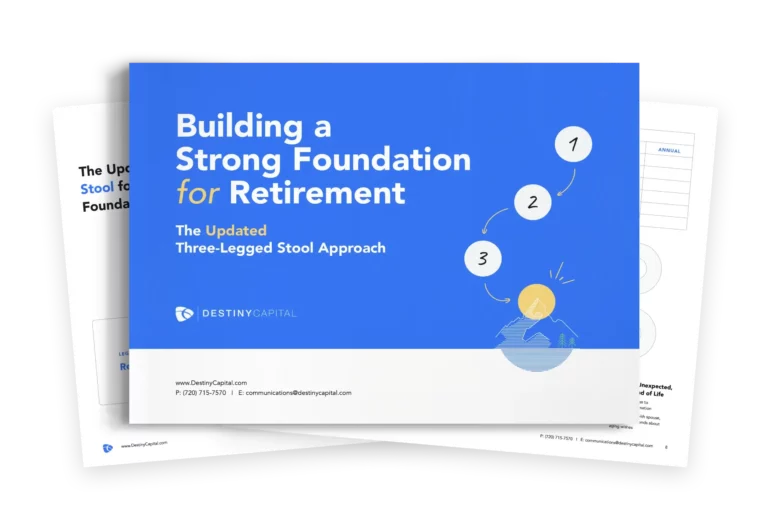CIO Mailbag: Evolving Investment Strategies: Responding to Changing Markets and Economic Conditions
Can you share insights into your current investment strategy? How has it evolved, given market conditions and economic trends?
As is the case with everything these days, the world of investing continues to rapidly evolve. In fact, Destiny Capital’s long-term evolution as an investment manager has been an intriguing one. When our firm was founded many decades ago, our investment researchers primarily attempted to identify and acquire individual stocks that our analysis indicated had the most upside return potential. This stock selection strategy has since evolved and grown as market conditions and economic trends have changed over time.
To add some perspective, think about how much technology and innovation have changed investing over the years. Trading has gone from landline phones and physical stock certificates to retail investors having the ability to liquidate a $1 million portfolio with just a few taps on their smart phone. Novices can initiate elaborate options strategies from an app. Institutions can utilize complex algorithms to execute at a speed and frequency unattainable for human investors. Now more than ever, actionable investment information is ubiquitous.
Historically, one of the keys to effective investing has been an investment manager’s ability to uncover inefficiencies in markets. Identifying inefficiencies may provide an investor with an edge that, ideally, will lead to enhanced returns over time.
However, with technological advancements proliferating the dissemination of information, it became a bit more difficult to uncover inefficiencies when selecting individual stocks because, well, other investment managers were operating with the same information. Over time, the efficacy of stock picking began to dissipate as public markets grew more and more efficient. Furthermore, the proliferation of products like mutual funds and, eventually, exchange traded funds (ETFs) provided investors with cost-effective access to a near-limitless variety of public market investment strategies.
Therefore, Destiny Capital’s focus shifted from seeking exposure to a select group of individual stocks to seeking exposure to an optimal mix of asset classes. What is an asset class? Examples of an asset class might be Large Cap U.S. stocks, Long-Term U.S. Treasury Bonds, Real Estate, Emerging Market stocks, Convertible Bonds, Precious Metals, Private Equity and many, many more.
This shift to asset class exposure enhanced two essential, and interrelated, elements of investing; diversification and risk management. When investing in a select group of individual stocks, an investor may seek to diversify some of this risk across factors such as company size, sector/sub-sector, and geography. However, risk tends to remain concentrated. Furthermore, due to the advent of new technologies, we operate in a hyper liquid environment where
When diversifying across asset classes, it is possible to construct optimal portfolios of disparate investments that react and perform differently in a variety of market environments. In short, asset class diversification ideally allows a portion of a portfolio to zig while another portion of a portfolio zags. This helps to buffer against volatility and allows an investor to remain in the game over the long run.
Furthermore, asset class investment opportunities continue to get increasingly more exciting over time. Unlike stock picking, asset class selection goes far beyond standard publicly traded stocks and bonds and moves into a key area that we are seeking to increase investor exposure now and in the years to come – alternative investments.
‘Alternatives’ may represent a large umbrella of asset classes, but tend to be private strategies that, historically, have been off-limits to most investors due to high minimums, complex ownership structures, stringent liquidity restrictions, elevated costs, and other barriers to entry. However, this is an area where we have seen substantial innovation in recent years with investment managers introducing exciting new products and strategies that are available to all investors, not only endowments, foundations, and ultra-high-net-worth families.
At Destiny Capital, we believe that alternative investments remain a key area where inefficiencies still exist and may be used to further enhance risk-adjusted returns. We’ve already begun allocating to alternative asset classes and will continue to seek investment opportunities in this arena as products and strategies become even more effective, efficient and less cost prohibitive. We view this as the next step in Destiny Capital’s evolution as investment managers, and it’s bound to be an exciting path forward for both our firm and our investors.
This article is for informational purposes only and should not be relied upon as a basis for your investment, business, or personal financial decisions. We recommend consulting with your wealth advisor, CPA/tax advisor and/or attorney, as applicable to your situation, prior to implementing any new tax, legal, or investment strategy. Advisory services provided by Destiny Capital Corporation, a Registered Investment Adviser.
Share this
Build a Resilient Retirement
Don’t wait—download our essential retirement guide and start planning for a secure future.

Achieve Your Retirement Goals
Get personalized advice to meet your retirement goals. Book your call with Destiny Capital now.



